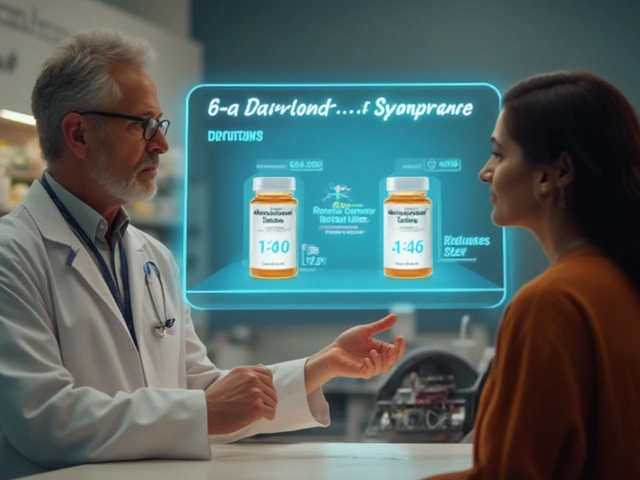Medication Cognitive Risk Calculator
How This Tool Works
This tool calculates your Anticholinergic Cognitive Burden (ACB) score based on the medications you take. The ACB scale rates drugs from 0-3 where higher numbers indicate greater risk of memory problems and brain fog.
Your Cognitive Risk Score
It’s not just aging. You’re not losing your mind. But you are forgetting where you put your keys, blanking on names, or feeling like your thoughts are wrapped in cotton. And if you’ve started a new medication recently - even something over the counter - that fog might not be in your head. It might be in the pill bottle.
What’s Really Going On When Medications Fog Your Brain
Brain fog from medications isn’t a vague feeling. It’s a measurable drop in cognitive function. You might struggle to focus, forget conversations minutes after they happen, or feel mentally sluggish even after a full night’s sleep. Unlike dementia, which slowly erodes memory over years, this kind of impairment often shows up within days or weeks of starting a new drug - and it can vanish just as quickly when you stop it. The science is clear: certain drugs interfere with how brain cells communicate. They block key chemicals like acetylcholine, which helps you form memories, or calm down brain regions like the hippocampus, where new memories are stored. The result? Short-term memory glitches, trouble concentrating, and that heavy, slow feeling you can’t shake.The Top Culprits Behind Medication-Induced Memory Loss
Not all drugs affect your brain the same way. Some are far more likely to cause problems than others. Here are the most common offenders, backed by clinical studies and patient reports:- Anticholinergic drugs - These include older allergy meds like diphenhydramine (Benadryl, Tylenol PM), bladder medications like oxybutynin (Ditropan), and some tricyclic antidepressants like amitriptyline. They block acetylcholine, a neurotransmitter critical for memory. Research shows people using these regularly have up to a 50% higher risk of memory problems, and long-term use raises dementia risk by 54% over seven years.
- Benzodiazepines and sleep aids - Drugs like alprazolam (Xanax), lorazepam, and especially zolpidem (Ambien) suppress activity in brain areas responsible for memory formation. Ambien users report memory gaps in 15% of cases - far more than older benzodiazepines. Many people wake up with no memory of the night before.
- Opioid painkillers - Oxycodone, hydrocodone, and morphine slow down working memory by acting on receptors in the brain’s memory center. Even at standard doses, they can reduce cognitive performance by 25%.
- Chemotherapy drugs - Known as “chemo brain,” this affects up to 75% of cancer patients. Symptoms include trouble multitasking, slowed thinking, and word-finding issues. For 35% of people, these problems last months or years after treatment ends.
- Corticosteroids - Prednisone and similar drugs can trigger sudden confusion, disorientation, or mood swings, especially at doses above 20mg/day. These symptoms often appear within days and mimic anxiety or depression.
What’s surprising? Even drugs you wouldn’t expect can cause issues. Newer antidepressants like SSRIs, the acne drug isotretinoin, and the transplant medication ciclosporin have all shown links to memory problems in studies - not because they’re neurotoxic, but because of how they interact with brain chemistry in sensitive individuals.
Who’s Most at Risk?
You don’t have to be elderly to experience this. But older adults are far more vulnerable. About 30% of seniors on multiple medications report cognitive side effects. Why? As we age, our liver and kidneys process drugs more slowly. That means the same dose stays in your system longer, increasing its impact on the brain. People taking three or more medications are at highest risk. Drug interactions can multiply side effects. A sleep aid plus a painkiller plus an antihistamine? That’s a triple hit on your brain’s chemistry. A 2023 AARP survey found that 62% of adults over 50 blamed their memory lapses on medications - not aging. And it’s not just about the drug. Your genes matter too. Variants in genes like CYP2D6 and CYP2C19 affect how fast you break down certain medications. Some people metabolize drugs slowly and build up toxic levels without realizing it. That’s why two people taking the same pill can have completely different experiences.
How to Know If It’s the Medication - Not Something Worse
The biggest relief? This kind of memory loss is usually reversible. If you’re worried about Alzheimer’s or another neurodegenerative disease, here’s how to tell the difference:- Medication fog comes on suddenly - within days or weeks of starting a new drug. It’s inconsistent. You might have a good day, then a foggy one. You’re aware you’re forgetting things.
- Dementia creeps in slowly. People often don’t realize they’re forgetting things. Memory loss gets worse over months and years, not days. It affects daily life in predictable, worsening ways.
If you’ve noticed memory lapses after starting a new pill, write down:
- The name of the medication
- When you started it
- When the fog started
- What symptoms you’re having (forgetting names? trouble focusing? zoning out?)
Bring this to your doctor. Don’t stop any medication on your own - but do ask: “Could this be causing my brain fog?”
What You Can Do: Relief That Actually Works
The good news? You don’t have to live with brain fog. Here’s how to fix it:1. Review Every Medication - Even OTC
Many people don’t realize that over-the-counter sleep aids and allergy pills are major offenders. Diphenhydramine is in over 100 products - from cold medicine to pain relievers. Check labels. If you see “PM,” “Nighttime,” or “Diphenhydramine,” it’s likely contributing to your fog.2. Ask About Alternatives
For sleep: Swap Ambien or Benadryl for melatonin (0.5-5mg) or trazodone (25-50mg). Clinical trials show 85% of users see improvement within two weeks. For pain: Try duloxetine (Cymbalta) instead of opioids. Studies show 40% less cognitive impact at equivalent pain relief levels. For allergies: Switch from diphenhydramine to loratadine (Claritin), fexofenadine (Allegra), or cetirizine (Zyrtec). These have 3-5 times less anticholinergic burden.3. Reduce Anticholinergic Burden
Doctors now use tools called the Anticholinergic Cognitive Burden (ACB) scale to rank drugs by risk. High-risk (ACB=3) drugs include amitriptyline, oxybutynin, and diphenhydramine. Medium-risk (ACB=2) includes some SSRIs and older antipsychotics. Low-risk (ACB=0-1) are newer options like sertraline or escitalopram. Ask your doctor to run your meds through an ACB calculator. Cutting just one high-burden drug can improve memory test scores by 15-20% in 4-6 weeks.4. Timing Matters
Take sedating meds at night - not in the morning. A Johns Hopkins study found that simply shifting drowsy drugs to bedtime reduced daytime brain fog by 35% in 78% of patients. You’re not changing the dose - just when you take it.5. Get a Medication Review
Starting in 2024, Medicare Part D now covers pharmacist-led medication reviews for cognitive risk. Pharmacists can scan your full list, flag high-risk combinations, and suggest safer alternatives. This isn’t optional anymore - it’s a covered service.What’s Changing in 2025
The medical world is waking up. In March 2024, the FDA required all benzodiazepine labels to include clear warnings about memory loss. Hospitals now use electronic systems that flag high anticholinergic burden before prescriptions are filled. New drugs are coming. Daridorexant (NCT04788598), a next-gen sleep aid, shows 92% less cognitive impairment than Ambien in early trials. Genetic testing for drug metabolism (CYP2D6, CYP2C19) is moving from labs into clinics. University of Michigan’s 2024 trial showed that using genetic data to guide medication choices cut cognitive side effects by 63% compared to standard care. This isn’t science fiction. It’s the new standard. The goal isn’t just to treat your condition - it’s to treat it without fogging your mind.
Real Stories: What Patients Are Saying
On Reddit, u/MemoryLapse2023 wrote: “Took 5mg Ambien for two weeks. Woke up with no memory of the night. Felt like I was underwater all day. Stopped it. Three days later, my brain came back.” Over 147 people echoed that exact experience. A 68-year-old woman in a Pharmacy Times case study went from confused and disoriented to clear-headed within 10 days after stopping oxybutynin for bladder control. She didn’t have dementia. She had a drug reaction. Amazon reviews for diphenhydramine products are full of lines like: “Woke up with no memory of the night before,” and “Brain fog lasted all day - even after coffee.” These aren’t anecdotes. They’re data points.When to Worry - And When to Breathe
If your brain fog started after a new drug, and it’s mild to moderate - there’s hope. Most cases improve within days to weeks of stopping or switching the medication. Don’t panic. Don’t assume it’s permanent. But don’t ignore it either. If you’ve been on multiple meds for years and feel like you’ve lost your edge, it’s not too late. A systematic review of one drug at a time - guided by your doctor - can restore clarity you thought was gone for good. Your brain isn’t broken. It’s just overloaded. And you have more power to fix it than you think.Can over-the-counter sleep aids cause memory loss?
Yes. Over-the-counter sleep aids like Benadryl, Tylenol PM, and Unisom contain diphenhydramine, a strong anticholinergic drug. Studies show regular use increases dementia risk by 54% over seven years and causes memory blackouts in up to 15% of users. Even one night of use can leave you feeling foggy the next day. Safer alternatives include melatonin or trazodone.
How long does medication-induced brain fog last?
It depends on the drug and how long you’ve taken it. For most people, symptoms begin lifting within 3-7 days after stopping the medication. Full recovery usually takes 2-4 weeks. With long-term use of high-burden drugs like tricyclic antidepressants, it can take up to 6-8 weeks. Chemo brain may last months or longer, but even then, improvement is common with time and support.
Do antidepressants cause brain fog?
Some do. Tricyclic antidepressants like amitriptyline have strong anticholinergic effects and are linked to a 4.2-fold higher risk of memory problems. Newer SSRIs like sertraline or escitalopram have much lower risk - only 1.8 times higher than non-users. If you’re on an older antidepressant and feeling foggy, ask your doctor if switching to a newer option could help.
Can statins cause memory problems?
The evidence is mixed. A small number of people report brain fog after starting statins, but large studies - including one with over 1,000 participants - found no significant difference in memory or thinking between statin users and placebo groups after six months. If you suspect statins are the issue, talk to your doctor. Don’t stop them without guidance, but consider a trial off the drug under supervision to see if your symptoms improve.
Is brain fog from medication permanent?
No. Unlike Alzheimer’s or other neurodegenerative diseases, medication-related brain fog is typically reversible. Once the offending drug is stopped or switched, most people see improvement within days to weeks. The key is identifying the right culprit and working with your doctor to adjust your regimen safely.







Bhanu pratap
28 October, 2025 10:04 AMBro, I was taking Benadryl for allergies and felt like I was underwater all day. Stopped it. Three days later, my brain came back like I’d been rebooted. Seriously, check your OTC meds-they’re sneaky as hell.
Meredith Poley
29 October, 2025 23:05 PMLet me get this straight-you’re telling me the same drug that puts grandma to sleep is also erasing her memory? And we’re surprised? The FDA should’ve flagged this in the 90s. Now we have a whole industry built on selling cognitive decline as ‘normal aging.’
Mathias Matengu Mabuta
31 October, 2025 18:04 PMWhile I appreciate the sentiment, the premise is fundamentally flawed. Correlation does not imply causation. The very act of being prescribed multiple medications often indicates underlying systemic pathology-neurodegenerative, metabolic, or inflammatory-which independently impairs cognition. To attribute brain fog solely to pharmacological agents is to ignore the confounding variable of disease burden. Furthermore, the ACB scale lacks validation in longitudinal cohorts and is statistically underpowered for individual risk prediction. This is anecdotal medicine dressed as science.
Ikenga Uzoamaka
1 November, 2025 04:14 AMI took oxybutynin for 3 years... and I thought I was just getting old... I forgot my daughter's birthday... I forgot my husband's name... I cried for 2 hours because I didn't know why I felt so lost... I stopped it... and my brain came back... I'm not exaggerating... I'm not dramatic... I'm just... alive again...
Lee Lee
2 November, 2025 12:24 PMDid you know the FDA’s warnings on benzodiazepines were pushed by Big Pharma lobbying? They want you to think it’s the pills-but it’s the vaccines. The mRNA spikes bind to cholinergic receptors and mimic anticholinergic effects. That’s why the fog started right after 2021. The meds are just a cover. Check your vax card. The real culprit is in the lipid nanoparticles.
John Greenfield
4 November, 2025 07:25 AMStop blaming drugs. You’re just lazy. If you had a real job, slept less on your phone, and exercised, you wouldn’t need Ambien or Benadryl in the first place. This isn’t a medical crisis-it’s a moral failure. People today want to be medicated into clarity instead of working for it.
Dr. Alistair D.B. Cook
5 November, 2025 01:55 AMLet’s not forget-this is all part of the ‘cognitive industrial complex.’ Pharma companies profit from the fear of dementia. They market drugs that cause brain fog, then sell you supplements to ‘fix’ it. Meanwhile, the real solution? Fasting. Ketosis. Cold showers. Your mitochondria don’t need a pill-they need a revolution. I’ve been off all meds for 14 months. My IQ went up. My dreams are vivid again. The system doesn’t want you to know this.
Ashley Tucker
6 November, 2025 10:06 AMOf course Americans are blaming their pills. We’re a nation of people who think a pill fixes everything. In my country, we just deal with it. We don’t whine about ‘brain fog.’ We go to work. We raise kids. We don’t need a 2,000-word essay to tell us to stop taking Benadryl. Just stop. Grow up.
Allen Jones
8 November, 2025 09:13 AMI’ve been tracking this since 2020. Every time they release a new antidepressant, the CDC reports a spike in ‘unexplained memory loss.’ Coincidence? No. They’re testing neurochemical suppression on the population. The real goal? To make us docile. Less critical thinking. More compliance. That’s why they’re pushing SSRIs and sleep aids. It’s not about health-it’s about control. Check the patents. Look at the board members. You’ll see the same names behind the vaccines, the meds, and the surveillance tech.
jackie cote
9 November, 2025 18:39 PMWrite down your meds. Call your pharmacist. Ask for an ACB score. Don’t wait for a crisis. This is preventable. You have agency. Start today.
ANDREA SCIACCA
11 November, 2025 08:08 AMI used to take Ambien every night... I woke up once and didn't know where I was... I thought I was dead... I screamed... my dog ran out of the room... I cried for three days... I thought God was punishing me... I stopped it... and now I dream in color again... I'm not the same person... I'm not broken... I was poisoned... by a pill... with a smiley face on the bottle...
Camille Mavibas
12 November, 2025 08:03 AMOMG I thought I was going crazy 😭 I took Zyrtec for a cold and felt like my brain was cotton... then I read this and realized-wait, that’s not Zyrtec... that’s the cold medicine with diphenhydramine in it 🤦♀️ switched it out... 48 hours later... I remembered my own phone password 😭 thank you for this post 💖
Shubham Singh
13 November, 2025 02:28 AMYou think this is bad? Try living in India where doctors prescribe diphenhydramine like candy. My uncle took it for 12 years. He forgot his wife’s face. He forgot his own children. He thought he was still 30. They call it ‘senility’ here. But it’s not senility. It’s negligence. It’s poverty. It’s the fact that no one cares enough to ask, ‘Why is he so foggy?’
Hollis Hamon
15 November, 2025 00:06 AMThank you for writing this. I’ve been working with elderly patients for 18 years, and I’ve seen this exact pattern repeat. One simple switch-oxybutynin to mirabegron-turns a confused, withdrawn person into someone who remembers their grandchild’s name. It’s not magic. It’s pharmacology. And we’re failing them by not asking the right questions.
Adam Walter
16 November, 2025 06:07 AMLet’s talk about the elephant in the room: polypharmacy is the silent pandemic. We’ve turned medicine into a buffet-grab a pill for sleep, a pill for anxiety, a pill for reflux, a pill for joint pain, and then wonder why your mind feels like a browser with 47 tabs open. The solution isn’t just swapping one drug for another-it’s radical de-prescribing. I’ve seen patients shed 7 meds and regain their cognitive spark. It’s not about adding more-it’s about subtracting the noise. Your brain isn’t broken. It’s just overstimulated by a system that treats symptoms like commodities, not signs.